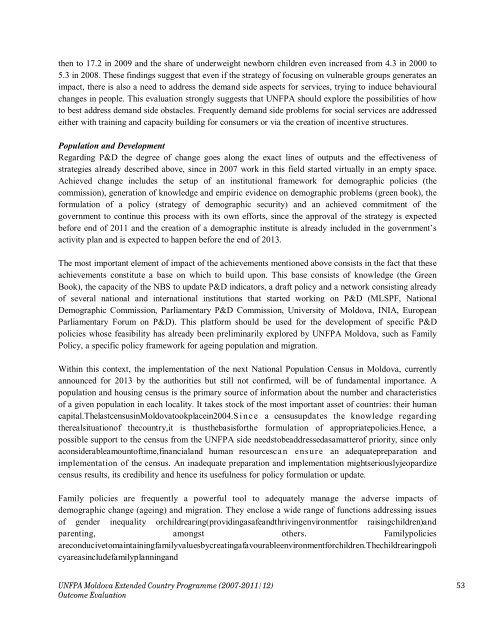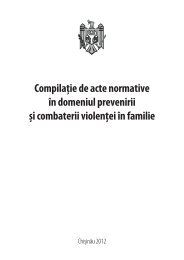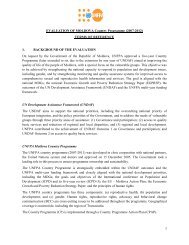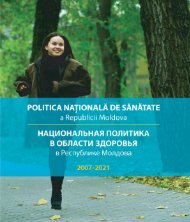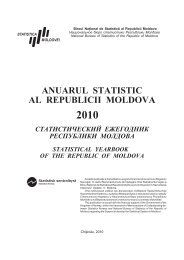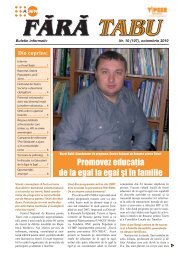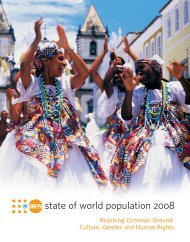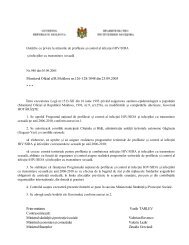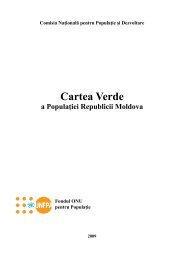Country Programme (2007-2011/2012) evaluation - UNFPA Moldova
Country Programme (2007-2011/2012) evaluation - UNFPA Moldova
Country Programme (2007-2011/2012) evaluation - UNFPA Moldova
You also want an ePaper? Increase the reach of your titles
YUMPU automatically turns print PDFs into web optimized ePapers that Google loves.
then to 17.2 in 2009 and the share of underweight newborn children even increased from 4.3 in 2000 to<br />
5.3 in 2008. These findings suggest that even if the strategy of focusing on vulnerable groups generates an<br />
impact, there is also a need to address the demand side aspects for services, trying to induce behavioural<br />
changes in people. This <strong>evaluation</strong> strongly suggests that <strong>UNFPA</strong> should explore the possibilities of how<br />
to best address demand side obstacles. Frequently demand side problems for social services are addressed<br />
either with training and capacity building for consumers or via the creation of incentive structures.<br />
Population and Development<br />
Regarding P&D the degree of change goes along the exact lines of outputs and the effectiveness of<br />
strategies already described above, since in <strong>2007</strong> work in this field started virtually in an empty space.<br />
Achieved change includes the setup of an institutional framework for demographic policies (the<br />
commission), generation of knowledge and empiric evidence on demographic problems (green book), the<br />
formulation of a policy (strategy of demographic security) and an achieved commitment of the<br />
government to continue this process with its own efforts, since the approval of the strategy is expected<br />
before end of <strong>2011</strong> and the creation of a demographic institute is already included in the government’s<br />
activity plan and is expected to happen before the end of 2013.<br />
The most important element of impact of the achievements mentioned above consists in the fact that these<br />
achievements constitute a base on which to build upon. This base consists of knowledge (the Green<br />
Book), the capacity of the NBS to update P&D indicators, a draft policy and a network consisting already<br />
of several national and international institutions that started working on P&D (MLSPF, National<br />
Demographic Commission, Parliamentary P&D Commission, University of <strong>Moldova</strong>, INIA, European<br />
Parliamentary Forum on P&D). This platform should be used for the development of specific P&D<br />
policies whose feasibility has already been preliminarily explored by <strong>UNFPA</strong> <strong>Moldova</strong>, such as Family<br />
Policy, a specific policy framework for ageing population and migration.<br />
Within this context, the implementation of the next National Population Census in <strong>Moldova</strong>, currently<br />
announced for 2013 by the authorities but still not confirmed, will be of fundamental importance. A<br />
population and housing census is the primary source of information about the number and characteristics<br />
of a given population in each locality. It takes stock of the most important asset of countries: their human<br />
capital.Thelastcensusin<strong>Moldova</strong>tookplacein2004.Since a censusupdates the knowledge regarding<br />
therealsituationof thecountry,it is thusthebasisforthe formulation of appropriatepolicies.Hence, a<br />
possible support to the census from the <strong>UNFPA</strong> side needstobeaddressedasamatterof priority, since only<br />
aconsiderableamountoftime,financialand human resourcescan ensure an adequatepreparation and<br />
implementation of the census. An inadequate preparation and implementation mightseriouslyjeopardize<br />
census results, its credibility and hence its usefulness for policy formulation or update.<br />
Family policies are frequently a powerful tool to adequately manage the adverse impacts of<br />
demographic change (ageing) and migration. They enclose a wide range of functions addressing issues<br />
of gender inequality orchildrearing(providingasafeandthrivingenvironmentfor raisingchildren)and<br />
parenting, amongst others. Familypolicies<br />
areconducivetomaintainingfamilyvaluesbycreatingafavourableenvironmentforchildren.Thechildrearingpoli<br />
cyareasincludefamilyplanningand<br />
<strong>UNFPA</strong> <strong>Moldova</strong> Extended <strong>Country</strong> <strong>Programme</strong> (<strong>2007</strong>-<strong>2011</strong>/12)<br />
Outcome Evaluation<br />
53


